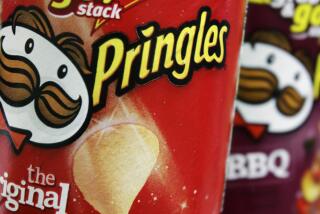Western Candy Companies Are Finding Business Is Sweet in Russia : Retail: Masterfoods, the maker of Mars and Snickers, saw revenue hit $300 million in 1994, thanks to aggressive advertising and accessible kiosk sales.
- Share via
MOSCOW — Conservative critics of Russian economic reforms complain about the “Snickerization of Russia,” an intrusive Western influence symbolized by the sale of imported chocolate bars in every corner of the country.
But for Masterfoods, which makes Mars and Snickers candy bars, the complaint is high praise indeed. Three years of aggressive advertising and the ability to exploit the kiosks that were the first sign of capitalism have begun to work.
“Kiosks played a vital role in our business here and for creating a freedom of choice in Russia,” said Jeff Smith, commercial director at Mars’ Masterfoods Moscow department.
“They are vital for our ‘eat-it’ idea, and they play a dual role in Russia: One can shop there and it is a surrogate for retail shops, which are now starting to emerge.”
Nikka von Liemandt, Masterfoods’ external relations manager, said revenue in Russia exceeded $300 million in 1994 and was still growing.
“We have a good steady growth in sales and it is continuing,” Smith said but he declined to give any figures.
High sales volumes have enabled Mars to invest some $200 million in Russia, including $150 million to build a factory in the town of Stupino, some 70 miles south of Moscow.
The plant, which is now testing equipment, will have an annual capacity of 50,000 to 60,000 metric tons of chocolate bars and pet food, which also is becoming popular in the new Russia.
“Our sales were very good and investment started flowing to support our sales. Building a factory was basically unavoidable,” Von Liemandt said.
But she said the plant would not satisfy all Russian demand and imports would remain high.
Mars has to compete with many other imports, including Nestle, Hershey and Cadbury chocolate bars as well as cheaper Turkish and Polish brands.
Cadbury Schweppes, which imported 26,000 tons of chocolates in 1994, is building a plant in the Novgorod region to produce around 40,000 tons of confectionery a year. The plant is due for completion in the second half of 1996.
Cadbury hopes to double its share of the Russia market to some 10%.
Switzerland’s Nestle, the world’s biggest food group, and Jacobs Suchard have opted to buy into local production companies.
Russia is Europe’s third largest confectionery market after Germany and Britain. Russians eat 500,000 tons of confectionery products each year, behind Germany’s 650,000 tons and Britain’s 625,000 tons.
Annual consumption is 8.8 pounds per head, compared with 12.57 pounds in countries of the European Union.
Russian chocolate makers, such as the Krasny Oktyabr (Red October) confectionery plant in Moscow, offer a different kind of competition, producing mostly boxed chocolate, traditionally popular in Russia.
But Mars does not think this is a problem. “Life here is changing and one does not open a box of chocolates too often any more,” Smith said. “Our snack-food idea is a slightly more up-to-date image of the product.
“We have made progress from a company which never existed here to a manufacturing business in Russia with a distribution system better than anyone else’s,” Smith said.
“For the first two years we learned a lot but sold a little. In 1993 we engaged local entrepreneurs. In 1994 we had to relearn and refurbish a lot. . . . In 1995, we started getting the benefits from all that learning and relearning.”
Von Liemandt said the aggressive television advertising campaign had helped. Colorful ads with modern music were a revelation for Russians, who saw almost no advertising before the collapse of the Soviet Union.
“When we came here we found out that many households had TV sets but no advertising . . . and no canned pet food. Television is widely spread and it appeared to be the best and obvious means to communicate with consumers, to tell them that what we have is good,” she said.
Smith said one problem was Russia’s unpredictability.
“Many things are changing daily--costs, taxes, ability to buy and sell property or to employ people,” he said. “What is a bit of a disappointment is that some things here take longer than they could.”
More to Read
Inside the business of entertainment
The Wide Shot brings you news, analysis and insights on everything from streaming wars to production — and what it all means for the future.
You may occasionally receive promotional content from the Los Angeles Times.










